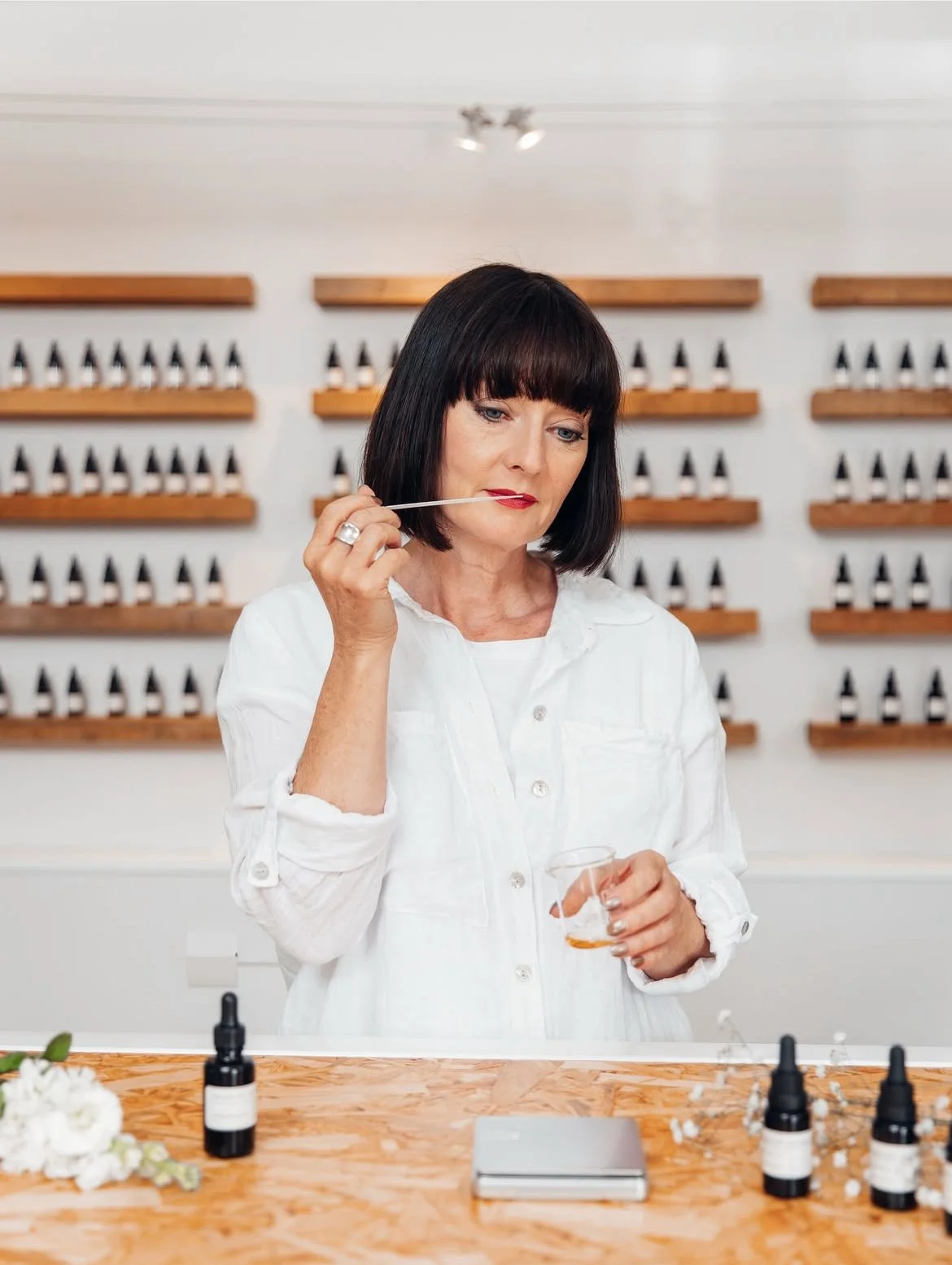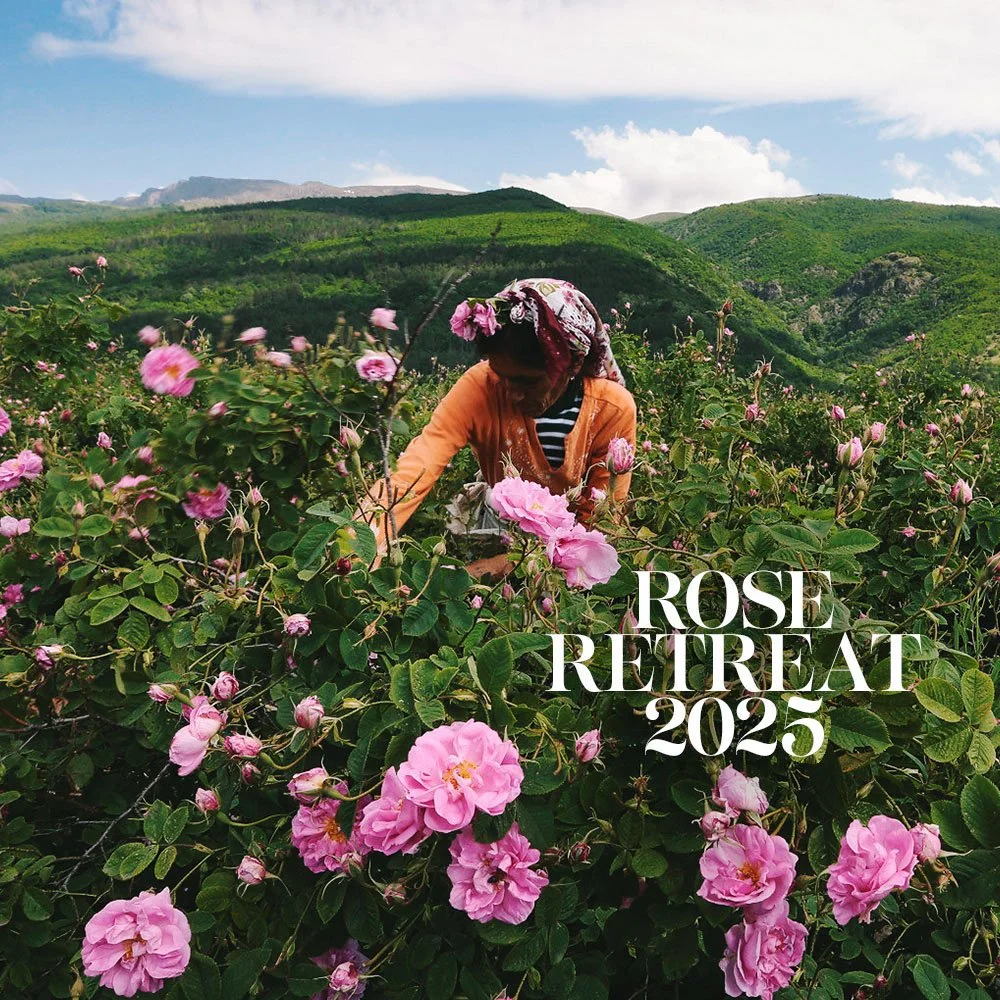Roses and Mindfulness with Karen Gilbert
British perfumer Karen Gilbert, renowned Perfumery Educator, Author, and Host of The Perfume Making Podcast, who also happened to be our guest perfumer for Rose Retreat 2025, is “talking roses” with us.
Q1. What drew you to the world of perfumery?
I kind of fell into it by accident; it wasn’t something I even knew was a thing when I was younger. I did get into aromatherapy as a teenager, more for the wellness aspects, and I guess I didn’t equate it to perfume. While I was at The London College of Fashion training to be a makeup artist, I discovered I loved the cosmetics science part and ended up on a work placement at IFF, which dropped me headfirst down the rabbit hole. It was also there that I discovered that there was a ton of research on scent and wellbeing, too, not just essential oils. For me, it's not just about art and beauty but about how our sense of smell is fundamental to our wellbeing and happiness.
Q2. Rose is a classical perfume ingredient, a symbol of beauty and romance. What makes rose such a timeless and powerful ingredient in perfumery?
I have to confess I’m not a massive rose fan of most rose-centric perfumes, although I adore rose oil and absolute on their own as materials. Putting on my perfumery teacher hat, though, rose is iconic and full of history and mythology. From a spiritual perspective, it's often used to symbolise the heart chakra, and I do feel it's a powerful inner connector. Whether you love it or not, roses will always make you feel something.
Q3. Each perfume tells a story. In your opinion, what narrative or atmosphere does a rose-centred fragrance convey?
I think it depends on the direction of the composition: is it a soft, gentle rose petal fragrance, a fun, fizzy sherbert rose, a deep, fruity jammy rose, a dark, thorny, velvet rose growing out of rich, damp soil, or an opulent oud rose with hints of spice? Even with Rose as the central character, each one would take a different direction and tell a different story.
Q4. In your work teaching students around the world, how do people typically respond to roses in their first compositions—do they embrace them, or find it challenging to work with them?
I think most people struggle with it as it's such a dominating force and has a reputation for smelling a bit like grandma if you’re not careful. I also think many of my students are a bit scared of it because of all the safety regulations around its use now. There is a divide between the natural perfumers and the mixed media folks, too - I think the naturals people have a strong connection to it, but the mixed media/commercial perfume fans often are not drawn to it. The idea of it, yes, perhaps, but the reality can be tricky.
Q5. Beyond its aroma, how does a rose make you feel?
For me, it’s about heart connection. There’s something about roses that bypasses your thinking mind and goes straight to the emotional core. It’s both soothing and strengthening. It helps me soften when I’ve gone into overdrive, but also holds me in a grounded way. Rose reminds me that you can be soft without being fragile. It’s steady, not sentimental.
Q6. With your experience in meditation, how might someone use rose in a daily self-care practice?
Rose is amazing for self-care, especially if you’re working on emotional processing or nervous system regulation. You don’t need anything fancy, just a simple rose-scented rollerball or balm, or even a cup of rose tea. I often suggest people take a few deep breaths with rose oil on their palms or pulse points before journaling or meditating. It helps bring you back to your heart, especially if you tend to live in your head. It’s a gentle prompt to check in with how you feel, rather than how you think you should feel.
Q7. Are there particular notes or ingredients that you love pairing with rose to highlight its healing aspects?
Sandalwood, definitely. There’s something about the way it anchors rose that feels really balancing, especially when you’re working on emotional or creative blocks. I also love pairing rose with deep, earthy materials like patchouli, vetiver, or even a touch of labdanum. It creates a sort of root-to-heart connection. In energy terms, it bridges the heart and root chakras. So you’re not just floating in the emotional or spiritual realm but grounded, and more able to integrate whatever’s coming up.
Q8. How can someone uncover their unique creative voice in such a saturated and trend-driven industry? Would you encourage perfumers to look inward rather than follow trends?
Always, always. I talk about this so much. As indie or artisan perfumer's you cannot afford to follow trends only. You need to create from your own authentic self. From your own story and inspirations.
Q9. Did you enjoy working with the Bulgarian Rose samples, the rose oil, and the rose absolute? Is there anything you would like to share with us about your experience with these materials?
I teach a 1-day natural perfumery class and always include rose, even though they are eye-wateringly expensive materials. Students need to smell what a good quality rose is, as there is so much adulteration now. I haven’t had a chance to test them in anything yet, but they are absolutely beautiful.
Q10. What are your expectations about the Rose Retreat and the perfume-making days?
Looking forward to it so much as it's my first time in Bulgaria, and surprisingly enough, in all my years in the industry, I have never got to go to a rose field before harvest. I love teaching workshops, but never really done one, just focused on roses, so that will also be fun.
The Rose Valley, Bulgaria


